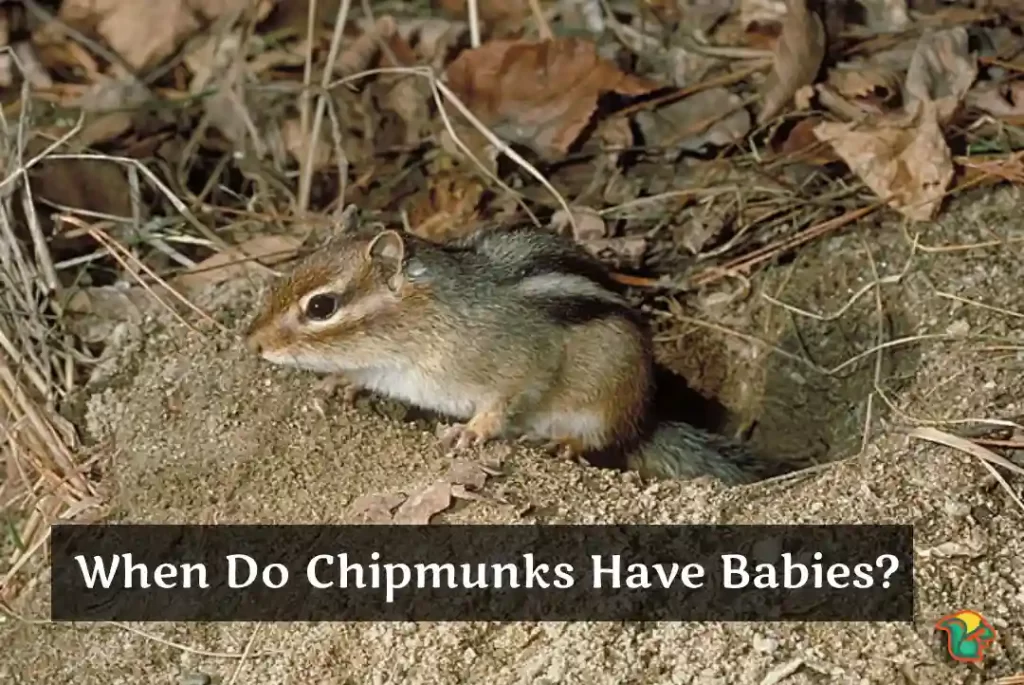When do Chipmunks Come out of Hibernation?
Hibernation refers to getting into sleep for a specific period. Bats, ground squirrels, and woodchucks are the most common and true hibernators in the animal kingdom.
But what you don’t know is if chipmunks hibernate too! They hibernate for a specific period and come out of their burrows when it is warm and cozy once again.
So when do chipmunks come out of hibernation? Do chipmunks of every place hibernate for the same amount of time? Out research will show it all!

When Do Chipmunks Come Out Of Hibernation?
Chipmunks come out of hibernation around mid-March when winter is gone. However, if the winter period extends, the chipmunks will also extend their hibernation period and emerge in April.
Hibernation in chipmunks occurs in late October and is simply an adaptation to enable them to survive extremely cold temperatures. They reappear when the weather outside becomes less harsh and the temperature starts rising.
That said, when the chipmunks reappear can vary depending on their location, temperature, and availability of food.
For instance, chipmunks residing in the farther North will only come out around march when the temperature gets warmer. And those residing in southern North America will come out of their burrows in late January, due to warmer weather in this region.

It’s also not unusual to spot chipmunks coming out of their holes during winter to search for food on days when the weather gets warm and there’s less snow cover.
But don’t they need to come out to get food? Chipmunks have food reserves stored inside their burrows in the summer and autumn months.
They create chambers and pile them up with enough food to last them throughout the winter period.
They usually wake up in between their hibernation periods to urinate or defecate and replenish their energy (i.e., eat food) before going back to their deep sleep.
The chances of seeing a chipmunk in your garden in winter are next to zero as they just stay underground to keep warm and safe.
Chipmunks and the Hibernation Period:
You are seeing a chipmunk often in the yard and you enjoy this little bushy animal. But in the winter, you search for it and you don’t get it anywhere. They tend to disappear suddenly in this season. Why do chipmunks suddenly disappear in the winter?
Rodents like chipmunks depend on veggies, nuts, and seeds. These are omnivores and live in North America mostly. Though they eat almost anything in the winter, food is scarce. So, how do they manage to protect themselves and feed them in the winter?

The answer is Hibernation! Yes, they go to hibernation when it’s winter. This is a survival technique for these mammals. They get into their burrows and hibernate there for the colder season and they only come out when it’s not cold and available food is there for them.
The Reappearance
So, we already know that chipmunks hibernate in the winter. But how long do they stay hidden? Well, firstly, we must tell you that they are not true hibernators. In October, when the weather starts turning cold, they go to hibernation.
To be clearer, their hibernating period starts in late October. So, what month do chipmunks come out of hibernation? In March, they get out of their hibernation and come out of their burrows. However, if the winter extends, they try to extend their hibernation period and come out in April.
Hibernation vs. Sleep
Well, as we have told you before, chipmunks are not true hibernators. Their hibernation is more like sleeping. They sleep inside their burrows when it is too cold outside. But they don’t sleep in the upper layer of the burrows.
So, where do chipmunks sleep in winter? These animals are creative and they create their burrows on two different levels. The surface or upper level is designed for summer or warmer weather. And when it is winter, in late October, they move to a deeper burrow that they have created throughout the warmer season.
This deeper burrow is connected to the upper level but this one stays warmer than the top one. As a result, it can keep them warm throughout the winter. To know more about it, you can check out where do chipmunks nest!
Here, you can know about the nesting levels and the survival techniques that such rodents follow for both warm and cold seasons. And when they see that it’s warm and cozy to get out in late March, they move to the top level of their tunnel.
The Breaks in Hibernation
So, their hibernation is more like sleep. But why so! Why they are not called true hibernators? It’s because they take breaks even when they are hibernating! In the warmer seasons, they work hard creating their nest and feeding themselves.
They eat a lot in the other seasons. At times, their weight might get double their normal weight. To survive winter and to stay in hibernation, their body needs food. In this period, the heart rate gets reduced. Also, the respiration rate is lessened.
Though their breathing rate per minute is 60, it might get reduced to 20 when they are hibernating or sleeping in the winter. Their body temperature falls to 40 degrees Fahrenheit from 100 degrees Fahrenheit. But it is still compared more to sleeping than hibernation! Do chipmunks come out during the winter to get food?
Well, as we have said, they wake up from their sleep in the hibernating period. Chipmunks do it so that they can eat food. In the previous seasons, they work hard eating enough food and storing them in their burrows too!
Their burrow-making technique and location selection makes them smart animals. Learn more about it in –where do chipmunks live! They store food in some chambers of their burrows. And when they get out of their hibernation period, they eat those foods so that they can survive the winter.
They wake up from their hibernation, eat food, and then go back to sleep once again! So, it’s more like sleep, don’t you think?
Southern Chipmunks and the Hibernation Period
We have discussed the Northern chipmunks above because 24 species of all the chipmunks are Eastern. They go to hibernation in late October. And they come out of their sleep in late March. Also, they wake up in between their periods of sleep.
But the thing is not the same with the Southern chipmunks. They do not have the same hibernation period. Southern chipmunks also live in North America but they have a different hibernating routine.
These animals get into sleep in December and they come out of their sleep in January. But these too get out of their hibernation and eat food before putting themselves to sleep once again. You won’t probably see them in your garden in the winter.
But when you see them in the warmer season, make sure you check out how to lure a chipmunk out of hiding and get rid of them. After all, you have to protect your property, right?
Underground Days and the Winter Season
We have already discussed that chipmunks wake up from their sleep to get food. But do they get out of their burrows to feed themselves? Or do chipmunks stay underground all winter? To clear it out, we have to know about their burrows a little more.
As we have mentioned above, they build different chambers in their burrows but they don’t live in each of them. Instead, they use the chambers as their storage for food. They bring food before winter and pile up the chambers with them.
And when the winter is hitting the world hard, they plan on hibernating keeping the food near. As a result, they can feed themselves when they wake up from their periods of sleep in between. As they already keep food inside, they don’t need to get out of their tunnels during winter.
So, there are almost zero chances of you seeing a chipmunk in the garden in winter. They spend almost the whole winter underground because that’s the only place to keep them safe and warm!
Wrap Up
Though chipmunks are not true hibernators the physical changes they go through are the same as hibernation. No matter what you call it, sleep or hibernation- they have their tactics to keep them protected. From their burrows to their hard work, you cannot skip their smartness! And when the weather is warm again, they come out of their holes to dig your grave- that’s said, you must get rid of it if you have one in your house or garden!





Hi, last year I was able to get a chipmunk to climb into my hand to get peanuts. I called it behavior modification. He was named Furbee and came regularly for peanuts. It was difficult to leave peanuts out for him as in between his visits the squirrels ate the peanuts. Furbee was such a joy to watch. So far, this year 4/11/2023. he has not reemerged. I say ‘he’ but not certain about that. I did not handle him, only let him into my hand and out when he’d had enough peanuts secured in his pouches.
Thank you for all your research and all you do for our little creatures. Trish